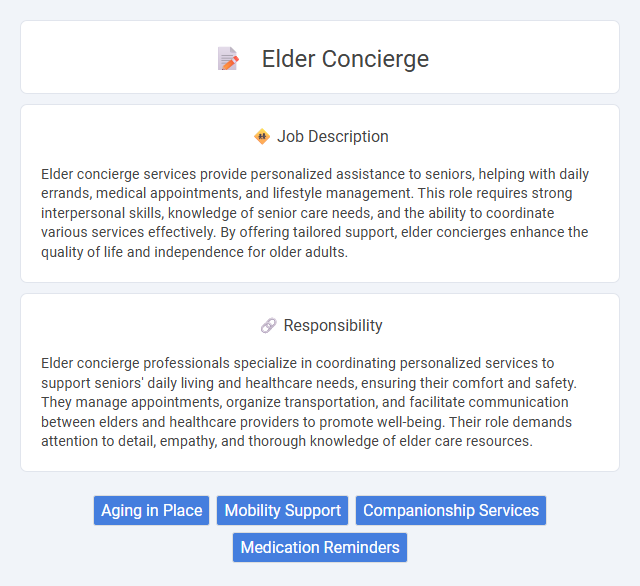
Elder concierge services provide personalized assistance to seniors, helping with daily errands, medical appointments, and lifestyle management. This role requires strong interpersonal skills, knowledge of senior care needs, and the ability to coordinate various services effectively. By offering tailored support, elder concierges enhance the quality of life and independence for older adults.
Elder concierge jobs may be suitable for individuals with strong empathy, patience, and excellent communication skills due to the frequent interaction with elderly clients who often require compassionate assistance. People with physical stamina and organization abilities might have a higher probability of handling the demands of helping older adults navigate various services effectively. Those lacking emotional resilience or experiencing significant stress might find this role challenging, reducing the likelihood of long-term job satisfaction.
Qualification
Elder concierge professionals require strong interpersonal skills and a background in healthcare or social services to efficiently manage senior clients' needs. Certifications in CPR, first aid, and elder care, along with experience in case management or patient advocacy, enhance their qualifications. Proficiency in scheduling, resource coordination, and compassionate communication is essential to provide tailored support and improve the quality of life for elderly individuals.
Responsibility
Elder concierge professionals specialize in coordinating personalized services to support seniors' daily living and healthcare needs, ensuring their comfort and safety. They manage appointments, organize transportation, and facilitate communication between elders and healthcare providers to promote well-being. Their role demands attention to detail, empathy, and thorough knowledge of elder care resources.
Benefit
Elder concierge services likely offer significant benefits by providing personalized assistance that enhances seniors' quality of life, including help with daily tasks and appointments. This role probably reduces stress and promotes independence for elderly clients, allowing them to maintain their routines comfortably. Families may experience peace of mind knowing their loved ones receive reliable, professional support tailored to their specific needs.
Challenge
The role of an elder concierge likely involves navigating complex medical and social systems, which can present considerable challenges. Managing diverse client needs, including mobility, medication coordination, and emotional support, may require adaptive problem-solving skills. Balancing empathy with efficiency is probably essential to successfully address the multifaceted demands of this job.
Career Advancement
Elder concierge professionals can advance their careers by gaining specialized certifications in senior care and healthcare management, increasing their expertise in coordinating personalized services for older adults. Mastery of healthcare systems, technology, and compassionate communication enhances opportunities for leadership roles such as senior care coordinators or elder care program directors. Continuous education and networking within the aging services industry are key to accessing higher-paying positions and expanding the scope of responsibilities.
Key Terms
Aging in Place
Elder concierge services specialize in supporting aging in place by providing personalized assistance tailored to seniors' unique needs, including transportation, healthcare coordination, and home safety assessments. These professionals help maintain independence and quality of life for elderly individuals by facilitating access to resources, managing appointments, and ensuring a secure living environment. Effective elder concierge care promotes aging in place by balancing comfort, safety, and social engagement within the senior's own home.
Mobility Support
Elder concierge professionals specializing in mobility support provide personalized assistance to seniors, facilitating safe and efficient movement within their homes and communities. They aid with transportation arrangements, accompany clients to medical appointments, and recommend adaptive equipment to enhance mobility and independence. By addressing physical limitations and promoting active lifestyles, elder concierges significantly improve the quality of life for elderly individuals.
Companionship Services
Elder concierge companionship services provide personalized support to seniors, enhancing their quality of life through meaningful social interactions and regular engagement. These services include conversation, assistance with hobbies, and accompaniment to social events, reducing feelings of isolation and promoting mental well-being. Specialized elder concierges tailor companionship based on individual preferences, ensuring emotional support and fostering a sense of connection.
Medication Reminders
Elder concierge services specialize in providing timely medication reminders to ensure seniors adhere to their prescribed schedules, reducing the risk of missed doses and potential health complications. These reminders are often personalized and synchronized with healthcare plans, supporting medication management through phone calls, text messages, or in-person visits. Effective medication reminders enhance seniors' independence and promote better overall health outcomes by preventing errors and encouraging consistent treatment adherence.
 kuljobs.com
kuljobs.com